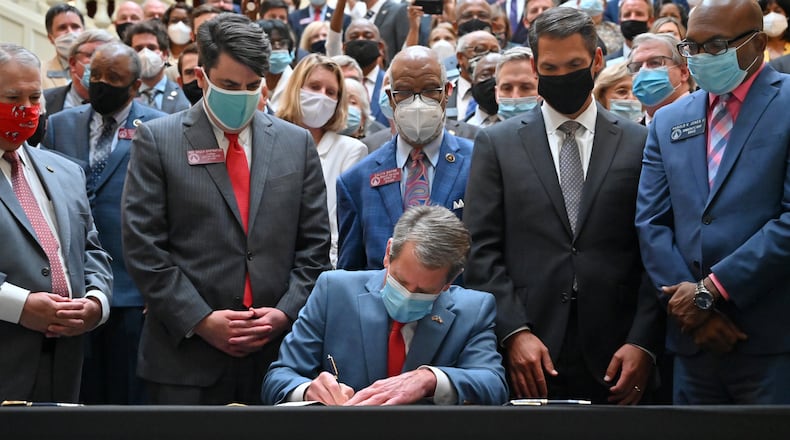On Friday, Gov. Brian Kemp signed House Bill 426 into law as dozens of lawmakers, lobbyists and supporters of the measure watched. It was the feel-good moment of the session, and deservedly so.
But that afternoon, the Georgia chapter of the NAACP announced it would skip the signing ceremony or the hate crimes bill -- because of legislation that Republicans put forward as a required companion to the measure.
Passage of HB 426 was spurred by the February slaying of Ahmaud Arbery, a 25-year-old man of African descent. In May, three white men were charged in connection with the coastal Georgia homicide.
However, for the first time, the Legislature also gave legal recognition and protection to members of the state’ s LGBTQ community.
Last week, Senate Republicans attempted to include police and other first responders as a protected class in HB 426. The effort came close to killing the bill. The solution was to pull out the references to law enforcement and include them in another vehicle.
Senate Bill 838 was put up for a vote by each chamber before lawmakers could vote on HB 426, the original bill authored by state Rep. Chuck Efstration, R-Dacula. In the House, SB 838 passed with a single vote to spare – while HB 426 received an overwhelming majority vote.
This kind of ransoming is rare, but not unheard of.
“This compromise in the political process will forever ring throughout history as a signal that Black lives are a bargaining chip toward a political end and dead, Black bodies are an expendable commodity in the halls of legislative power,” the Rev. James Woodall, president of the Georgia NAACP.
But if SB 838 is to become famous, it may be for its unintended consequences. The measure was passed by the Legislature with little vetting. From our AJC colleague Maya Prabhu:
According to the bill, anyone found guilty of the death, serious bodily harm or destruction of more than $500 worth of property of a first responder, specifically because of his or her occupation, would face between one and five years in prison and/or a fine up to $5,000.
Currently, the punishment for murder includes death, life in prison without the possibility of parole, or life in prison.
… Since the targeted killing of a police officer could be considered "bias motivated intimidation" of a first responder, the ACLU says a legal argument called the "rule of lenity" requires courts to pursue the charge that is the most favorable to a defendant.
"So now, if you kill a police officer in Georgia, and it's done under the statute of bias motivated intimidation, upon sentencing you can be sentenced between one to five years, instead of the mandatory life sentence," said ALCU of Georgia lobbyist Christopher Bruce.
Senate Judiciary Committee Chairman Jesse Stone, a Waynesboro Republican and attorney, told the AJC that he was made aware of a potential problem with the legislation late Friday:
"I think if they were charged with bias motivated (intimidation), that might be a concern," said Stone, who voted for HB 838 and is retiring this year. "I haven't studied it, but I think it's something that should be looked into."
But that's not all. Consider this meaty paragraph from SB 838:
A peace officer shall have the right to bring a civil suit against any person, group of persons, organization, or corporation, or the head of an organization or corporation, for damages, either pecuniary or otherwise, suffered during the officer's performance of official duties, for abridgement of the officer's civil rights arising out of the officer's performance of official duties, or for filing a complaint against the officer
Many Democrats fear that this passage would give police officers the right to chase down street protesters in the state's civil courts. And they might be right. But if you read the language carefully, it would give officers the right to take action against any entity. Even the local McDonald's that hires an officer to direct traffic outside the restaurant.
The above paragraph from was lifted from SB 392, a measure introduced In the February by state Sen. Randy Robertson, R- Cataula, as the "Peace Officers Bill of Rights." His bill never received a committee hearing.
On Sunday, state Sen. Jen Jordan, D-Atlanta, pointed us to the use of the phrase “civil rights” in that paragraph.
“We don't have a civil rights act in the state. They didn’t define it. Just to say a violation of civil rights -- I don’t even know what that means,” said Jordan, an attorney.
Jordan said a Democratic Senate colleague, Harold Jones of Augusta, has fastened on that last line in the paragraph that appears to allow police officers to file defamation suits against those who levy a complaint “which the person knew was false when it was filed.”
That actually raises, rather than lowers, the bar for libel and slander lawsuits, Jones contends. It would put police officers on a par with widely known public figures who must prove actual malice in order to win their cases.
Kemp has until Aug. 5 to decide whether to sign SB 838 into law.
***
State Rep. Chuck Efstration, R-Dacula, author of HB 426 and chairman of the House Judiciary Non-Civil Committee, sends word this morning that he will hold hearings in early July on legislation to repeal Georgia's citizen's arrest law.
“Enactment of HB 426 is only the beginning of our work following the killing of Ahmaud Arbery,” said Efstration. “We must redouble our efforts to identify and address injustices, wherever we find them, in the criminal justice system.
The state’s citizen arrest law was originally cited as justification by the white father and son who have now been charged with the Feb. 23 slaying of Arbery.
***
Presumptive Democratic presidential nominee Joe Biden's campaign has released a minute-long digital ad featuring a familiar face: Atlanta Mayor Keisha Lance Bottoms, his potential presidential sidekick. Check it out here.
***
Another potential Joe Biden running-mate, Stacey Abrams, will hold a morning conference call with her two preferred picks for the U.S. Senate -- Jon Ossoff and Raphael Warnock -- to highlight Georgia's battleground 2020 status.
U.S. Sen. David Perdue’s campaign released a preemptive strike against Ossoff, his challenger in November. His spokesman accused Ossoff of “hiding behind Stacey Abrams and her dark money group's endorsement.”
“If Ossoff thinks Abrams and her socialist agenda will be an asset for his candidacy, he's even more out-of-touch with the people of this state than we thought,” said Perdue spokesman John Burke.
Abrams is sure to invoke signs of Georgia’s competitiveness on the call: High voter turnout in this month’s primary, polls showing a tight race and two more recent developments.
On Friday, President Donald Trump’s campaign reserved about $280,000 worth of ads in Georgia. A relative pittance, but a signal that his campaign is shifting resources to the state.
And on Saturday, Trump’s Georgia operation opened an office in Sandy Springs, the heart of the Sixth Congressional District that Republicans are trying to regain in November.
***
Kelly Loeffler isn't alone. In the months following the eruption over her stock trades during a pandemic, the U.S. senator consistently blamed the liberal media for her troubles, ignoring the fact that much of the criticism aimed at her came from the conservative spectrum and U.S. Rep Doug Collins, a fellow Republican.
Secretary of State Brad Raffensperger is now taking a similar approach with a fundraising email over the weekend. Raffensperger sets aside the conservative criticism he has received for moving the state’s June 9 primary to a largely mail-in contest, in favor of a Democratic villain:
"I am taking a stand against Stacey Abrams and her radical left allies, and calling them out for their falsehoods and scams. Her brand of deceit is destructive to Georgia's future, and we can't let them get away with it."
Raffensperger comes up for reelection in 2022.
***
Georgia Democrats have elected five new members of the Democratic National Committee to serve for the 2020-2024 term. They'll join Nikema Williams, the party's chairwoman, and Ted Terry, the first vice-chair.
The five are: Rome City Councilwoman Wendy Davis; Savannah Mayor Van Johnson: strategist Pallavi Purkayastha; exiting Senate Minority Leader Steve Henson; and Alaina Reaves, a veteran party field operative and organizer.
***
New York Times columnist Roger Cohen spent two weeks in Georgia, taking in the protests and getting a feel for how this activism was reverberating in various pockets of the state.
In his resulting essay, he writes that Atlanta is an epicenter in many ways for both the coronavirus pandemic and concerns about police brutality. An excerpt from his piece, entitled "'Let Freedom Ring' from Georgia":
What became of the dream of Atlanta? It was always a progressive enclave surrounded by reactionary forces. If City Hall was the nexus of racial cooperation, the State Capitol was the nexus of segregation now and forever. Perhaps things were never quite as good as they seemed. African-Americans remained disproportionately poor and vulnerable. When Atlanta hosted the 1996 Olympics, Georgia's flag was still, in essence, the Confederate flag.
Progress on race issues is not resolution of race issues. Not in Atlanta, not anywhere, as Derek Chauvin's white knee on George Floyd's black neck demonstrated. Police brutality, mass black incarceration, poor education, redlining of neighborhoods all told a story so routine as to be invisible: A black life is worth less than a white life in America. That idea is woven into the psyches even of people loath to admit it.
The Floyd detonation was long in the making. With its large African-American population, about a third of the electorate, Georgia was bound to feel the reverberations. Democrats have not won Georgia, with its 16 electoral votes, since 1992, and Donald Trump had a clear victory here in 2016. Now several polls suggest Joe Biden is leading by a small margin (and is considering driving home his ascendancy here by choosing either Stacey Abrams or the Atlanta mayor, Keisha Lance Bottoms, as his running mate). This is the Covid-Floyd election, and Georgia has become a bellwether.
***
The two-part documentary "And She Could Be Next," featuring Stacey Abrams and U.S. Rep. Lucy McBath, premieres on PBS tonight and Tuesday. The movie focuses on women of color in politics and follows various 2018 campaigns.
We learned in the Chicago Sun-Times review of the documentary that producers also caught the arrest of Georgia Democratic Party Chairwoman Nikema Williams during a protest over voting rights when the governor's race was still contested. From the Sun-Times:
"They said they needed to strip-search me to make sure I wasn't hiding anything," says Williams in an interview for the documentary. "You just removed me from the rotunda of the Capitol, I showed up today to vote on legislation as a sitting member of the Georgia state senate, and you think I planted something in my vaginal cavity? I refused. … I'm not taking my clothes off. … I'm not doing it."
The Latest
Featured





